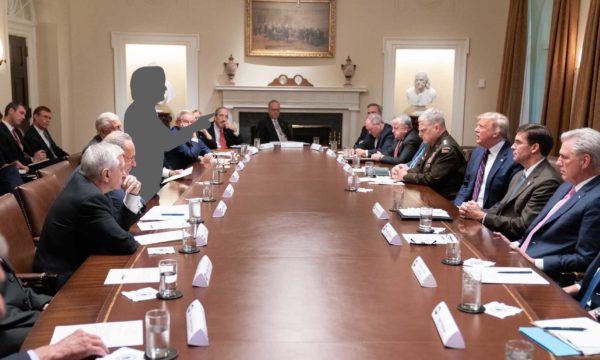3 Generations Debate Talking Politics At Work
August 16, 2019 | Filed in: Your Career
Peanuts cartoon creator Charles Schulz famously said, “There are three things I have learned never to discuss with people: Religion, politics, and the Great Pumpkin.” And while religion and the Great Pumpkin are still up for debate, in a post-2016 election world, it seems like more and more people are talking politics all the time—including in the office and amongst their co-workers. But just because people are doing it, does that make it okay?
Below, women across the generation spectrum weigh in the age-old question of bringing your politics into the workplace—and how the Trump era has completely shifted the paradigm of what is appropriate, and what isn’t.
When Is It OK to Talk Politics?
Across generations, a big differentiating factor in whether or not women think it’s appropriate to talk politics at work depends on the industry or individual workplace culture.
One of the biggest reasons that conversations about politics have become more commonplace at work across generations is that employees have concerns about how their companies interact with the government. Julie Lemieux, a Gen-Xer and naturalized U.S. citizen who’s worked in tech for over two decades, says that talking about the intersection of technology and policy is vital in her line of work. “The last company I worked for had contracts with the Department of Homeland Security, and we had difficult questions for upper management about the company’s stance in how our software was being used by Immigration and Customs Enforcement and Customs and Border Protection,” she explains. “We never got a good answer despite asking quite openly. It’s forcing many employees to reconsider their tenures, given their political and moral convictions.”
Want more M.M.? Sign up for our newsletter.
As Lemieux’s anecdote illustrates, values-driven work isn’t solely reserved for millennials and Gen-Zers; many employees in their 40s, 50s, and beyond care just as much about what their employers are up to. And at a time when it feels like there’s so much work that needs to be done in the country and around the globe, working for a company that doesn’t hold itself accountable to a purpose-centric mission can feel morally complicated.
Additionally, in a post-2016 world, talking about politics at work has become important for the well-being of so many women. “If anything, I think we talk about politics at work more because politics are overwhelming our social discourse,” says millennial and grad student Caroline Brooks. “It feels gross to talk about what happened on Big Little Lies last night when there are children in cages at the border. It feels irresponsible not to discuss how terrible this administration’s policies are and how we can be actively involved in resisting them. Silence feels like complacency now, even when it may have been the safer choice a few years ago.”

The Etsuko dress, and the Ponza earrings.
Millennial Willow Dalton, who works in marketing, has seen a similar shift and has found solidarity with her co-workers. “There’s not a day that goes by where [Donald Trump] isn’t a topic,” she says. “At my prior company, in November 2016 after the election, a wall of supportive Post-It notes organically popped up in the women’s restroom for people to commiserate. The Kavanaugh hearing live-streamed in my office last year on a big-screen TV, and my coworkers streamed the Mueller hearing on their computers (sans headphones). I still feel like I know more about the fiddly details but people aren’t ignoring it all anymore.”
Overall, women say there’s something freeing about admitting that the outside world affects the vacuum of the workplace. In other words, why come to the office and pretend everything is fine?
When Is It Taboo to Talk About Politics?
Across the board, more and more offices are talking politics than ever before—but that doesn’t necessarily mean there are positive results all around. “Because politics are so emotional, it’s riskier to talk politics at work because you can’t count on their logic overruling those emotions,” Gen-Zer and college student Catie Chesire mentions.
But while the 2016 election has made people much more likely to open up, Willow Dalton thinks it’s still important to be politically aware of who’s in a room—even though that can be hard sometimes. “I think I’m more cognizant of the potential to offend the one or two conservatives in the office than most people [at my office].” Dalton has one coworker who voted for Donald Trump, but that doesn’t stop the conversations about his administration’s actions.
Dalton’s experience also brings up another reason why it’s important to read a room. It’s one thing to talk about politics on a grand scale like Lemieux and her peers are doing in the tech world; it’s a whole other realm to talk about politics throughout the workday, where differing opinions or outspokenness can get in the way of your ability to get tasks done or work with other people to achieve basic business objectives.

The Hoffman blazer, the Mejia pant, the Lagarde shirt, the Wide Strap belt, and the Bezel earrings.
Roughly a decade and a half ago, Gen-Xer and human resources specialist Melissa Arvanitaki worked on a military base where she was one of the only women and the only Democrat in her office. Often, she didn’t speak up for fear of causing an argument and hindering the cohesion of her team. “I felt that it could have been perceived that I was anti-American if I spoke negatively about the government or the military,” she explains. “So there was that peer pressure to keep the course verbally or stay quiet.”
As a young person, Catie Cheshire also says that her age makes her think twice about speaking up politically. “I think it’s too risky to make enemies with people by disagreeing with a boss or supervisor in politics, and being an intern, almost anyone could be a supervisor on a task or project.” Understandably, many entry-level workers—particularly those who are young—are careful not to rock the boat and jeopardize their own careers in the process.
How Can You Handle Awkward Politics Conversations at Work?
Even if you work in the most apolitical office, chances are some politics talk will come up from time to time. So, how can you work through it if it’s something that’ll negatively impact your experience or the overall office environment? There are a few key steps to take.
Think About Your Audience
New York-based headhunter and ABS Staffing Solutions founder Ariel Schur recommends thinking of who might bristle at political talk in the office and steering clear of discussing it near them. “I always prefer to err on the side of caution and minimize the types of discussions because they can often get heated and polarizing,” she says.
For instance, if you’re sitting in the break room amongst a few colleagues who you know will only get into a shouting match with you over political ideology or sabotage your own work in the process, it’s best to save your opinions for outside of the office, or at least until you’re around co-workers who are more receptive.
Keep Conversations Informed, Relevant, and Evidence-Driven
That said, Schur says you shouldn’t avoid political discussions at work if they directly impact your industry or business. “In my field, both healthcare changes and laws surrounding minimum wage and salaries [are] intertwined with politics,” she explains. “It’s important to be current and aware of these topics, but I try to keep my commentary to more fact-based content without expressing too much of my own political views.”
In other words, there can definitely be a fine line between getting political and being informed. Pretending that government oversight doesn’t exist won’t stop various policies and laws from affecting your workplace or your role; it’s crucial for most jobs that you know what’s happening in the world around you. But how you present that to your office is what matters. As Schur mentions, keeping discussions respectful, relevant to your office, and evidence-based can go a long way to making political conversations much more appropriate—and you may even change a few minds over time with that approach.

The Zora top, the Harlem skirt, and the Claressa earrings.
Be Respectful Above All
Looking back at her experience on the military base and now at a company with more political diversity, Arvanitaki says that a simple mindset shift can make political discussions much less divisive. “I think it boils down to being able to have conversations to understand the other person’s point of view instead of trying to convince the other person to change their mind,” she says. “People are getting grouped up to the extremes and it’s creating a lot of discourse without discussion.”
Upon first glance, it’s easy to assume that certain generations may be more open to political talk in the office than others—but that’s not necessarily the case. Especially post-2016, workplaces are quickly shifting, and women across the generational spectrum want to have their voices heard. So the next time you’re upset about the latest news story or want to celebrate a political win, you don’t always have to keep your mouth shut. Just make sure you read the room first.









